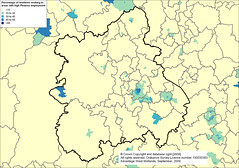Fast Job Resume . comLearn how to write a resume, write a cover letter, and
find a job or find a new career-- fast!
I’m looking for CV and cover letter sample, please help me.?
Posted by
brian
in
(HELP) - Cover Letter Samples
on
Sep 19th, 2010
|
2 responses

Image taken on 2009-09-30 00:00:41. Image Source. (Used with permission)
Related posts:

Without knowing about you, no one can design a resume, for you. But I can offer you some tips.
First, you should lead off your resume with your contact information. That goes right at the top.
Next, you can put your objective for a job. Naturally, that objective should be tailored to sound very much like the particular job you are applying for. It can be anything from “Retail position with opportunity for growth and career potential” to “Opportunity to participate in the NASA astronaut program.”
At one time, the job-objective statement was the make-or-break part of your resume. But in these days of word processors, everyone knows that you ARE tailoring the objective to sound like the particular job, so that whole section has become optional.
After the objective, the next part of the resume should state your major credential. That means your experience, IF you have really relevant experience. If you are right out of school, looking for your first professional job, then your schooling is the most important thing to talk about that, so put that first. And put your *last* school is usually the only one that matters. So, college comes first (unless you also have grad school). If you are applying right out of high school, give the name of your high school. No one cares where you went to middle school, and if you went to college, no one probably cares where you went to high school. They want to know where you just graduated.
Then, put the other credentials below. If experience is your big selling point, school goes afterward. If school is your best point, put your job experience (yes, even McDonald’s, if that’s where you worked) underneath.
Finally, there is the question of references. Some people put in names and addresses. I just write “strong references available on request.” It keeps the resume shorter. You should try to get everything on one page–two pages at most.
The cover letter should be even shorter. It should summarize the resume BRIEFLY and just ask for an interview. (“I am a recent graduate of Harvard, and I saw your advertisement in the New York Times. I am looking for my first job as a brain surgeon, and I would very much appreciate an opportunity to discuss your needs and my abilities.” ) lol!, but you get the idea.
You can see a bunch of different resumes at the Web site below:
http://www.google.com/images?hl=en&expIds=17259,17315,18168,23628,23670,25834,25900,26328,26441,26446,26459,26515,26568&sugexp=ldymls&xhr=t&q=sample+resume&cp=8&safe=off&um=1&ie=UTF-8&source=univ&ei=YAKLTMCbEIL_8Abd-onGCQ&sa=X&oi=image_result_group&ct=title&resnum=4&sqi=2&ved=0CEIQsAQwAw&biw=1129&bih=721
BTW, always read any ad very carefully. Nothing kills an application like misunderstanding what they are looking for. So read closely, and in the future, don’t post resume questions in the Credit section of Y! Answers. (Sorry, I couldn’t resist.)
Good luck, and I hope this helps!
just put ur important information in a decent manner make a good cv.
no one goes on style and look of cv today. so ur information is imp and not style of cv.